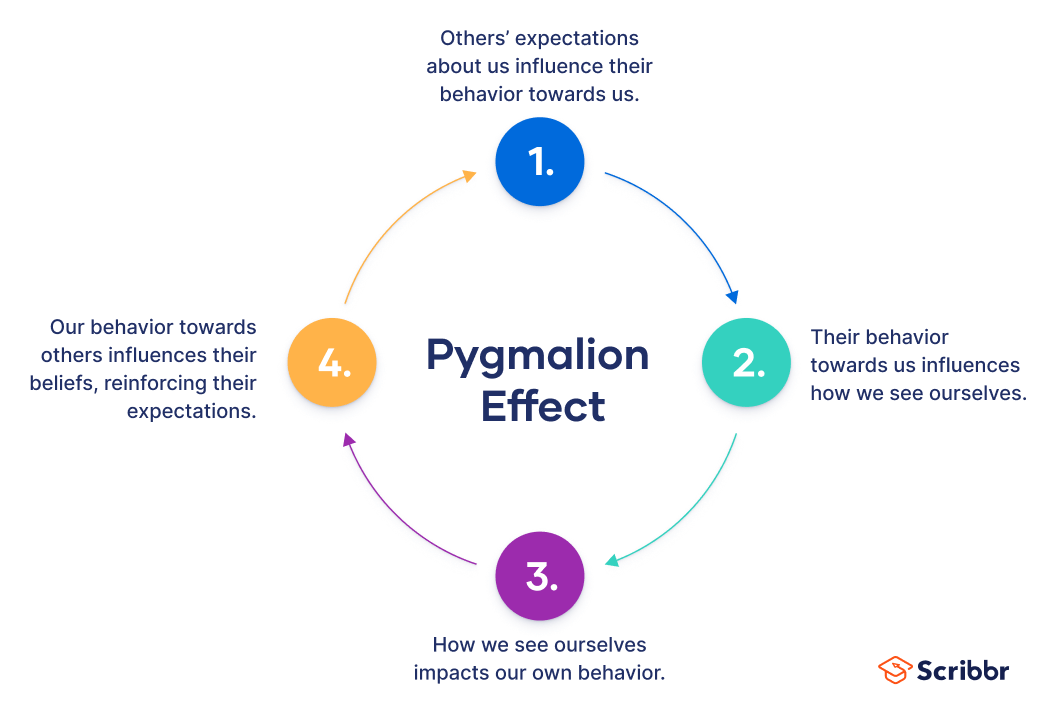Have you ever thought that sometimes a single sentence you say, a glance you give someone, or even an expression on your face can have a huge impact on others? We may not notice it in our daily lives, but our thoughts and attitudes can unconsciously influence those around us and even affect their future.
Today, we’ll explore an intriguing psychological concept known as the Pygmalion Effect. It tells us: The expectations you hold for others can actually shape them into the person you hope they become.
If you also want to know how to use your expectations to motivate others and even improve yourself, keep reading!
1. What is the Pygmalion Effect?
This term was first coined in 1968 by two psychologists named Robert Rosenthal and Lenore Jacobson. At the time, they conducted an experiment to observe the influence of teachers on students.

They told teachers at a school that some of their students were particularly smart and had great potential. But in reality, these students were not really better than the other children; they were just randomly selected. What happened? After a few months, the children who were considered “smart” by their teachers actually improved their grades.
What does this mean? It means that teachers’ expectations can influence students’ growth. This phenomenon later became known as the “Pygmalion effect.”
Simply put, the expectations you have for someone will be conveyed to them in various ways, causing them to slowly develop in the direction you expect.
2. Why does this phenomenon occur?
So how does this effect work? From a psychological perspective, there are several main reasons:
1. What you believe will become reality
For example, if someone thinks you are great and often encourages you, you will also start to think that you are indeed good, so you will be willing to work harder. Over time, you will really improve.
It’s like planting a seed in your heart. As long as you keep watering and fertilizing it, it will grow into a big tree.
2. What we say and do affects others
Have you ever had this experience? When someone praises you for doing a good job, you feel more motivated; but if others always criticize you and deny you, you may become less and less confident.
Therefore, when we have expectations of others, we will unconsciously treat them better, such as giving them more encouragement or more opportunities. These behaviors will make the other person feel supported and become more positive.
3. Positive expectations motivate people
Imagine if your boss said to you every day, “I believe in you!” Wouldn’t you feel more motivated to do your job? On the contrary, if he always said, “You’re not going to do it,” you might give up before you even started.
This is the power of the Pygmalion effect — your expectations directly influence other people’s actions and performance.
3. Real-life story: A child’s transformation
Let’s look at a real-life example to help you better understand how this effect works.
Kelly was a middle school student who had always struggled academically. Because she consistently performed poorly, she gradually lost confidence, stopped paying attention in class, and often didn’t do her homework.
However, in her second year of middle school, her homeroom teacher was replaced by Mr. Zhang. This teacher had a firm belief: Every child has potential, and with enough attention and encouragement, they can all improve.
At a parent-teacher conference, Mr. Zhang told Kelly’s mother, “I think Kelly is a very smart child. As long as she is willing to work hard, she will definitely achieve good results.”
This statement may seem ordinary, but it deeply moved Kelly’s mother. After returning home, she shared the teacher’s words with Kelly.
Hearing this, Kelly felt warm inside. For the first time, she felt that someone believed in her. So she decided not to give up on herself and began to study hard.
In the days that followed, Mr. Zhang often praised Kelly for her small improvements, talked to her one-on-one, and helped her solve difficult problems in her studies. Gradually, Kelly became more and more confident, began to raise her hand in class, and finished her homework on time.
By the end of the semester, her grades had shot up from the middle of the class to the top ten!
You see, this is a real example of the Pygmalion effect. Teacher Zhang’s trust and encouragement helped Kelly regain her confidence and ultimately make tremendous progress.
4. How can we apply this effect in our lives?
The Pygmalion effect is not only useful in school, but can also be applied in many areas of life. For example, at home, at work, and among friends, you can help others grow by adjusting your expectations.
Here are a few suggestions you can try in your daily life:
1. Give positive expectations to those around you
Whether it’s your children, colleagues, or friends, believe in their abilities.Don’t always think that they can’t do it, but believe that they can and convey that trust to them.
For example, you can say to your child, “I believe you can do it!” instead of “Why can’t you do it right?”
2. Give positive feedback in a timely manner
When others make even the slightest progress, don’t forget to praise them in a timely manner. Even a simple “You did a good job this time” can be a great motivator.
Positive feedback not only boosts people’s confidence, but also motivates them to keep trying.
3. Avoid negative comments as much as possible
Sometimes we may not mean to discourage others, but a careless negative comment can cause the other person to lose confidence. Therefore, we must learn to control our emotions and say less negative things.
For example, instead of saying, “You’ll never be able to do it,” say, “You’ve made progress, and with a little more effort, you’ll be even better.”
4. Set positive goals for yourself
In fact, this effect applies not only to others, but also to yourself. How you view yourself will directly affect your behavior and results.
If you always tell yourself, “I can’t do it,” then you are likely to fail. But if you believe you can do it, then your chances of success will greatly increase.
So, try saying something encouraging to yourself every day, such as, “I can do it, keep going!” Stick with it for a while, and you will notice a change in yourself.
5. Have you ever experienced something like this?
After reading this article, can you think of any experiences in your own life? Has anyone ever changed because of something you said or a look you gave them? Or has anyone ever made you more confident and work harder because they believed in you?
Feel free to share your story in the comments section. Maybe your experience can inspire more people!
Summary:
The Pygmalion effect tells us that our expectations of others really do affect their performance. Whether at school, at home, at work, or in our daily lives, we can use positive attitudes and language to motivate others and ourselves.
Remember this: If you believe someone can do it, they will be one step closer to success.
So, starting now, try to view the people around you in a more positive light. Perhaps your words could change someone’s life.

